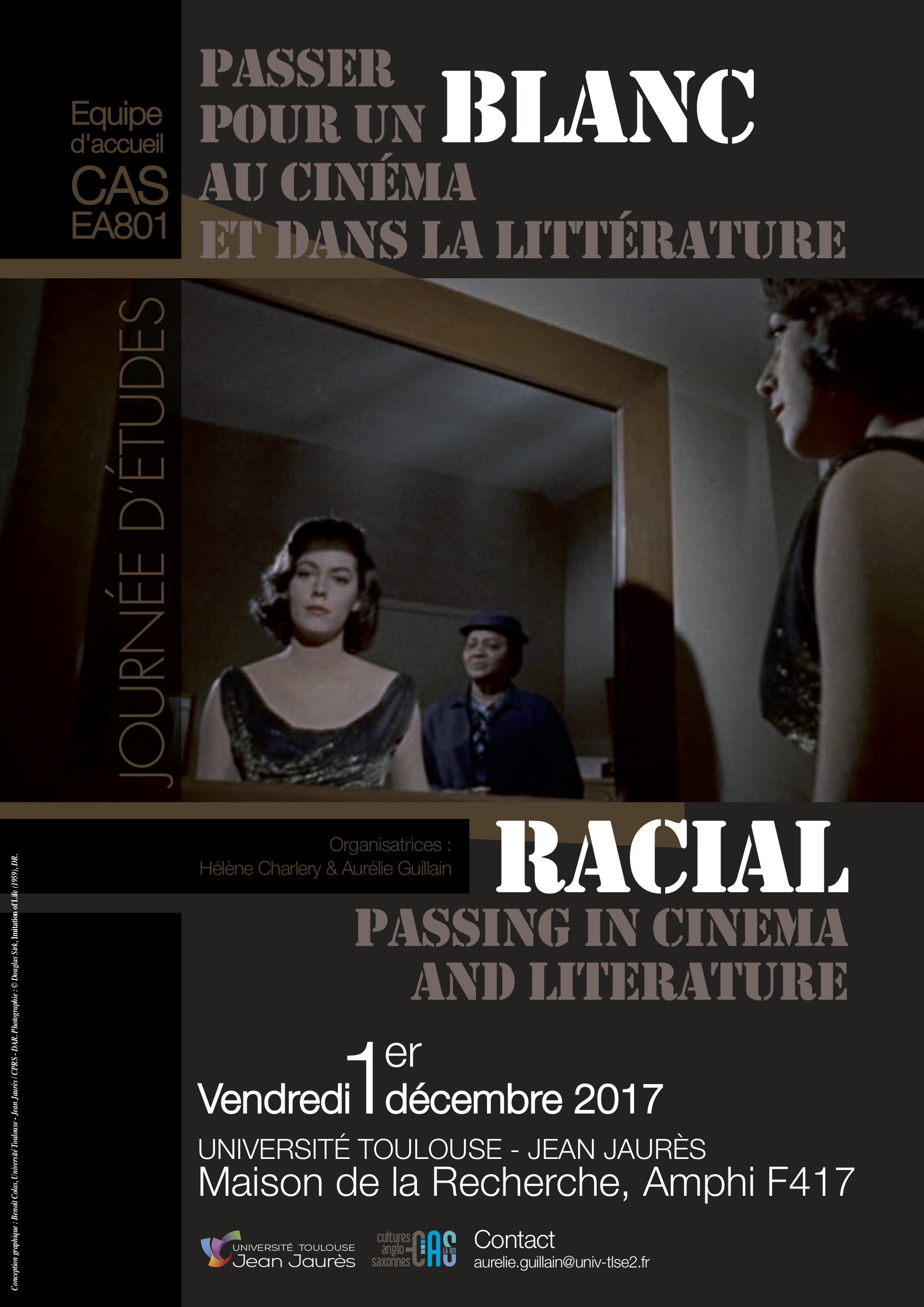-
Partager cette page
Passer pour un blanc au cinéma et dans la littérature / Racial Passing in Cinema and Literature

Le racial passing appartient-il au passé? Aux Etats-Unis, les trajectoires des individus à la peau très claire qui se faisaient passer pour des blancs sont relativement difficiles à documenter puisque la stratégie du racial passing consiste précisément à effacer les potentielles archives. Pourtant, de nombreuses fictions ont été dédiées aux secrets, aux dilemmes et aux hantises des passeurs de frontières raciales entre la fin du dix-neuvième siècle et la fin des années 50 aux Etats-Unis. Depuis les années 1990, le passing suscite un regain d'intérêt avec le développement des études sur le métissage mais aussi avec la reconnaissance progressive mais toujours problématique de la catégorie du métis dans les recensements et les représentations collectives aux Etats-Unis. Les gender studies et queer studies ont suggéré des articulations nouvelles entre le brouillage des frontières de genre et celle des frontières raciales dans l'ensemble du monde anglophone. Quant aux études sur les constructions historiques de la « blancheur », elles contribuent aussi à renouveler les approches du racial passing. A l'occasion de cette journée d'études, nous souhaitons revenir à notre tour sur le phénomène du passing et sur la diversité de ses représentations et interprétations dans la littérature et au cinéma.
Is passing really passé? In the 1920s and 1930s the figure of the light-skinned African American who crossed the color line and thus gained access to the privileged white caste attracted considerable interest both in the white and black reading public: the figure of the racial impostor revealed the contradictions of a system that constructed racial identities through hypodescent and the "one drop" rule - through strictly binary racial categories that prevented the category of the mixed raced individual from emerging in the United States. Since the 1990s, novels and films dealing with racial passing have been the focus of renewed attention, with the development of studies on the mixed race category and the rise of gender studies: the transgression of racial frontiers has often been articulated with the queering of gender boundaries thus broadening the implications of the act of passing. Scholars who focus on the shaping of whiteness as racial construct also brought new perspectives to the subject of racial passing. In this symposium we wish to continue exploring the complex aesthetic and ideological values of racial passing in literature or in film.
Programme :
9:00-10:00 Conférence plénière / Keynote address
Sinéad Moynihan – University of Exeter : “Passing Fads? Racial Passing, Reading and the Practice of Literary Criticism since the 1990s.”
10:00 Pause/ Break – F422
10:30-12:30 : New Forms of the Passing Novel.
Modératrice/ Chair : Marie Bouchet, Université Toulouse-Jean Jaurès
10:30 Kerry-Jane Wallart – Université Paris-Sorbonne “Gendered Subjection and Spectatorship across the Black Atlantic : Nella Larsen, Michelle Cliff and Zadie Smith.”
11:00 Anne-Catherine Bascouls – Université de la Côte d’Azur : “ 'Se faire passer pour' jusqu’à s’effacer : la dichotomie voix/corps et le problème identitaire dans The Time of Our Singing de Richard Powers.”
11:30 Ohad Reznik – Ben-Gurion University of the Negev: “Between Fiction and Reality: Passing for Non-Jewish in Multicultural American Fiction.”
12:00 Julie Iromuanya – University of Arizona: “Black Being, White Masks: Musings on A. Igoni Barrett’s Blackass.”
12:30 Pause-déjeuner/ Lunch – F422
13:30-15:00 To Pass or Not to Pass at the Turn of the 20th century
Modératrice/ Chair: Marie Liénard-Yétérian, Université de Nice- Sophia Antipolis
13:30 DeLisa Hawkes – University of Maryland: “The Decided (Dis)Advantage in Whiteness: Passing in Albion Tourgée’s Pactolus Prime.”
14:00 Nathalie Dessens – Université Toulouse Jean Jaurès: “From Homer Plessy to Paul Broyard: To Pass or Not to Pass in New Orleans.”
14:30 Aurélie Godet – Université Paris-Diderot: “Racial Passing at New Orleans Mardi Gras: Flight of Fancy or Masked Resistance? (1850s-1940s).”
15:00 Pause/ Break – F422
15:30-17:00 Passing as Subversion
Modérateur/ Chair: David Roche, Université Toulouse Jean Jaurès
15:30 Jochem Riesthuis – University of Amsterdam: “Pamphlet Passing: the Strange Cases of Black No More and Focus.”
16:00 Nova Smith – University of Chicago: “Passing Over? Passing’s More Revolutionary Cousin— the Cinematic Infiltration Narrative.”
16:30 Maureen Lepers – Université Sorbonne Nouvelle-Paris: “'I told you I wanted a black one this time' : révisions surnaturelles du Racial passing et de la One-drop rule dans The Skeleton Key (La Porte des secrets, Ian Softley, 2005).”

